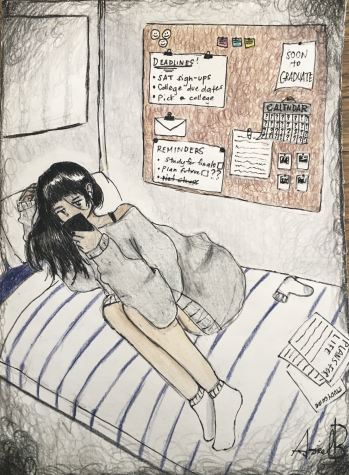Imposter Syndrome: a mental battle
February 25, 2022
Imposter syndrome: noun. The persistent inability to believe that one’s success is deserved or has been legitimately achieved due to one’s own efforts or skills.
First discovered in 1978 by Professor Pauline Clance and Psychologist Suzanne Imes of Georgia State University, imposter syndrome was coined in a study of high-achieving women who doubted their success. But as time passed, imposter syndrome became present in others; current studies show that many experience imposter syndrome at least once in their lives. Imposter syndrome doesn’t discriminate.

Dr. Pauline Rose Clance, Ph.D., ABPP, author of The Impostor Phenomenon, has discovered that about 70% of people experience imposter syndrome to varying effects during their lifetime. Systems were recorded to have lasted from a few weeks or for entire lives.
Janelle Milanes, author of Analee, In Real Life, has imposter syndrome and sometimes finds it challenging to write, being that Latinx authors are a minority in Young Adult literature.
“I still struggle with imposter syndrome at times,” Milanes said in a Forbes interview. “I am an incredibly thin-skinned person, and no matter what good things people say about my books, I will disregard them and obsess over the few not-so-good things. I have to remind myself daily to believe in myself. Some days that comes more easily than others.”
Dr. Valerie Young, an internationally known expert, states that imposter syndrome comes in five different forms: the Perfectionist, the Superwoman/man, the Natural Genius, the Soloist, and the Expert: all tie into an inability to recognize successes and achievements as self-earned.
However, writers Ruchika Tulshyan and Jodi-Ann Burey disagree. Their article, published in the Harvard Business Review, states that imposter syndrome is mainly associated with women of color in a male-dominated work environment. But multiple studies, like The Imposter Phenomenon, state that imposter syndrome affects “individuals,” not just high-achieving women.
There’s no way to prevent feeling imposter syndrome fully, but a solution for dealing with it is quite simple: talk to someone about it. Whenever you feel yourself starting to doubt, go to someone you trust because having a strong support system you can depend on will only help.
So if you have ever experienced this, or feel it today, remember: you are not alone.











